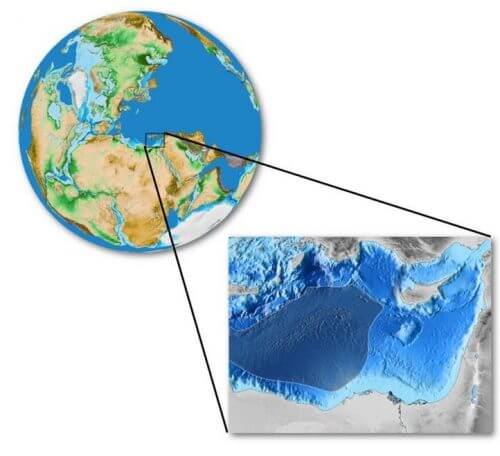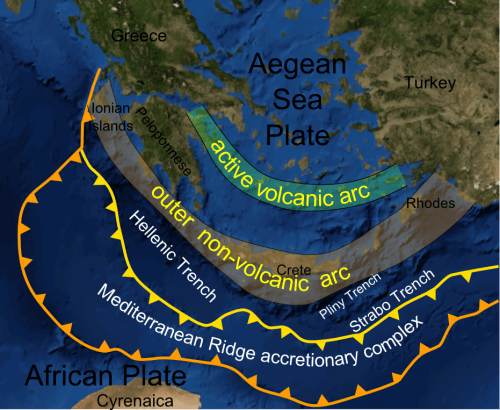It appears fromA new joint study by the Geological Institute, the Hebrew University and the University of Haifa. This figure has an impact on gas and oil exploration in the eastern basin of the Mediterranean Sea. "The models by which they decide where to drill to look for additional reservoirs are very complicated, but certainly the true age of the basin is an extremely important figure," said Dr. Uri Shatner from the University of Haifa, one of the authors of the study

The Eastern Mediterranean Sea is 100 million years younger than what we thought and is "only" 150 million years old, according to a new study published in the prestigious journal Earth-Science Reviews by Dr. Amit Segev from the Geological Institute, Prof. Eitan Shesh from the Hebrew University and Dr. Dr. Uri Shatner from the Leon Charni School of Marine Sciences at the University of Haifa. The research was presented about two weeks ago at a conference of the British Geological Society that focused on the issue of gas in the Mediterranean Sea, and also included senior executives of the major energy companies. The age of the Mediterranean Sea is an important component in gas and oil exploration models, therefore the claim of a younger age of 100 million years actually changes the basic rules on which they have been based until today.
The definitive article so far regarding the time of the formation of the Mediterranean Sea was written 20 years ago. According to the data that existed at the time, the study determined that the area was formed about 250 million years ago. The discovery of the gas reservoirs about a decade ago led to a burst of drilling in the eastern basin of the Mediterranean Sea, where each such drilling brought with it a series of new data. So when Dr. Segev, Prof. Shesh and Dr. Shatner began their current research, they had at their disposal hundreds more new data items concerning the sediments, the level of magnetism, the density of the material and the geological structure of the subsoil - in the continental area and in the deep sea. By analyzing the new and old data together, it became clear to the researchers that the Mediterranean Sea was "only" formed 150 million years ago.
According to Dr. Shatner, the new discovery "preys the cards" when it comes to the gas and oil explorations that have been taking place intensively in recent years in the region. "The gas discoveries in Tamar and Levitan have made the Eastern Mediterranean one of the most important areas for energy companies, on a global scale. But the essential questions regarding additional reservoirs begin below the base of the drilling, in the depth of the earth that has not yet been drilled. The companies base the decisions on very complicated models, in which the age of the pelvis (timing of formation) is an extremely important figure. Indeed, when we presented the research findings at a conference in London where representatives of all the major energy companies were present, we very quickly became the talk of the day," he said.

The researchers explained that at this stage it is impossible to know whether their new finding increases or decreases the chance of finding additional energy reserves, but it is clear that they completely change all the basic assumptions on which the energy companies operate today. For example, the younger the Mediterranean Sea, the less time the gas can escape from the reservoirs, so the chance of more gas increases. On the other hand, the new age that the researchers point to brings its formation closer to the period of huge volcanic eruptions that took place in our region about 150 million years ago and therefore apparently greatly heated the underground reservoir areas. The warming encourages the gas to escape from the reservoirs, so the chance of finding large reservoirs decreases. Beyond all this, the research findings are very important to calculate the chance of finding oil reserves in deeper layers, when oil is still a significant resource and much more expensive than gas.
As part of the new research, the researchers found another discovery, which is related to the energy discoveries, but it actually has more political significance. According to the Law of the Sea - the UN convention that, among other things, discusses the "distribution" of marine resources between the various countries - the 12 miles adjacent to the coast are considered the territorial territory of each country, while the next 200 miles are considered the exclusive economic territory of the country - with every discovery of an energy reserve, For example, it belongs to her. Since the Mediterranean basin is too small - and crowded with countries - no country really has such a large area, and the sea is divided into "slices" that are associated with each country.
The law of the sea states that all these measurements start from the transition zone between the Earth's terrestrial crust and marine crust. This is a strip parallel to the coast, which until today the studies have shown to be only tens of kilometers away from the coast. The new study found that for the State of Israel - this transition strip is located hundreds of kilometers from the coast, between Egypt and Cyprus.
As mentioned, since the eastern lake of the Mediterranean is small anyway, and apparently this transition point is also different in other countries, it is difficult to determine how and whether the new figure will change the distribution of economic waters. "For sure, there is a new figure here that is important for policymakers in Israel to know, and they will already decide what to do with it.", the researchers said and concluded: "The study emphasizes how important it is to open up data to academic researchers. The research results are of central importance on the national, economic and scientific level."
More of the topic in Hayadan:
- The floor of the eastern Mediterranean preserves an ancient ocean
- What really happens in the depths of the Mediterranean Sea?
- Opinion: Why is it not so bad that the gas will remain at the bottom of the sea
- Atlantropa - the crazy plan from 1928 to close the Mediterranean Sea and create a supercontinent

3 תגובות
Life is not the Torah of Israel set such a date
But it is an old calculation of a Christian monk
And a certain stream of rabbis accepted it as fact
There is no need to stick to this or that person's account
as a found truth
According to the Torah of Israel, the world was created before God one thousand nineteen eight years ago. 5778 years.
It seems that the study is just throwing numbers in the air
According to the Torah of Israel, the world was created before God one thousand nineteen eight years ago. 5778 years.